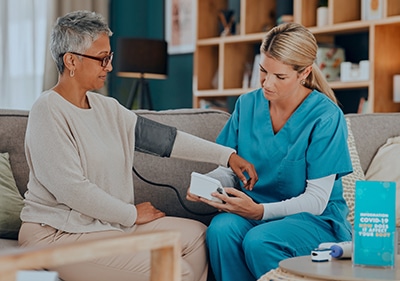Going through surgery can be a challenging experience, but recovering in the comfort of your own home can make all the difference. With the right support and after surgery in home care, you can focus on healing and getting back to your normal life. In this blog post, we’ll explore the importance of post-surgery in-home care, the types of services available, how to prepare your home, and tips for a successful recovery. Are you or a loved one planning for an upcoming surgery? Let’s dive into the essentials of after surgery in home care and post-operative care at home.
Understanding the Importance of Post-Surgery In-Home Care
Post-surgery in-home care offers a multitude of advantages, ranging from physical benefits to emotional support and reduced stress for family members. By providing the right care and environment, surgery patients can focus on healing and return to their normal life sooner than they might in a hospital setting.
We will now delve into the numerous benefits of in-home care and its significant role in facilitating recovery.
Physical Benefits
One of the most significant aspects of post-surgery in-home care is the personalized attention patients receive, tailored specifically to their needs. This includes assistance with daily activities, such as personal care, which may be difficult to manage after surgery. Additionally, patients can benefit from specialized treatments like physical therapy, provided by a skilled physical therapist, which can help them regain strength, flexibility, and coordination. Having a dedicated postoperative care nurse or therapist can ensure that patients receive the support they need for a speedy recovery.
Furthermore, the trust, personal connections, and sense of safety that in-home care cultivates can enhance overall well-being and ensure continuous assistance throughout the recovery process. In this comfortable and familiar environment, patients are more likely to feel at ease and focus on healing. With the right care plan in place, post-surgery patients can work towards regaining their independence and resuming their normal activities.
Emotional Support
An often-overlooked aspect of post-surgery recovery is the emotional support provided by in-home caregivers. Recovering from surgery can be a stressful time, and having a compassionate professional by your side can make a world of difference. In-home caregivers can provide companionship and reassurance, helping patients feel less isolated during their recovery.
Moreover, this emotional support can extend to family members as well. In-home care can alleviate stress for family members by providing professional assistance and guaranteeing patient safety, contributing to their loved one’s recovery. In-home care services extend their support beyond the patient, creating a comforting network for the entire family during challenging times.
Reduced Stress for Family Members
Family members overwhelmed by post-surgery care demands can find immense relief in in-home care services. By providing professional assistance and ensuring patient safety, in-home care services can alleviate stress and allow family members to focus on their own well-being.
Furthermore, having a dedicated certified nursing assistant can also help lift the burden of daily tasks, such as meal preparation and transportation, allowing family members to spend more quality time with their loved one.
In short, in-home care can create a more organized and supportive environment for both the patient and their family during the recovery process.
Types of In-Home Care Services for Post-Surgery Recovery
It’s important to be aware of the types of services available when considering in-home care for post-surgery recovery. We will now discuss the two primary categories: nonmedical and medical care services.
Learning the differences between these services aids in choosing the most suitable care provider for you or your loved one.
Nonmedical Care Services
Nonmedical care services focus on providing assistance with daily activities, companionship, and respite care for family caregivers. These services can include:
- Help with mobility
- Transportation
- Meal preparation
- Medication management
- Personal care
When you visit our website, you’ll feel like you’ve discovered a treasure trove of valuable information that will help you make informed decisions.
Companionship, in particular, can be beneficial for those recovering from surgery at home as it can facilitate the recovery process by providing emotional support and reducing feelings of loneliness.
By offering a helping hand with daily tasks, nonmedical care services can ensure that patients have the support they need during their recovery, including pain management. This assistance can go a long way in alleviating stress for both the patient and their family members, allowing everyone to focus on healing and returning to everyday life, which is the ultimate goal of returning to normal life.
Medical Care Services
While nonmedical care services provide valuable support for daily tasks, medical care services aim to address the more specialized needs of post-surgery patients. These services can include skilled nursing, wound care, and therapy services, all designed to create a comprehensive recovery plan tailored to the patient’s needs.
A postoperative nurse, for example, is responsible for:
- Providing medical care and guidance during the recovery process
- Ensuring that patients receive the proper treatment and support they need to heal effectively
- Working closely with the patient’s healthcare team
- Helping create a seamless transition from the hospital to the home, setting the stage for a successful recovery.
Preparing Your Home for Post-Surgery Care
Ensuring your home is ready for post-surgery care is vital before you or your loved one returns home after surgery. This preparation involves making necessary home modifications and gathering essential supplies for a safe and comfortable recovery environment.
We will now discuss the necessary steps to equip your home for post-surgery care after a surgical procedure.
Home Modifications
Home modifications can play a vital role in creating a safe and accessible environment for post-surgery recovery. These modifications may include installing grab bars in the bathroom, improving lighting throughout the home, and creating safe walking surfaces to prevent falls.
Additionally, you may want to rearrange furniture or remove clutter to make it easier for the patient to move around the home. By making these modifications, you can help ensure that your home is a safe and comfortable space for you or your loved one to recover in. This can go a long way in fostering a sense of independence and confidence during the healing process.
Gathering Essential Supplies
In addition to making home modifications, gathering essential supplies is a crucial step in preparing for post-surgery care at home. These supplies may include adaptive devices such as a walker, crutches, a shower chair, and an elevated toilet seat, as well as medical supplies like bandages, gauze, and pain-relieving medications.
Having these supplies on hand can help ensure that patients receive the proper care they need during their recovery. By being well-prepared, you can alleviate stress for both the patient and their family, creating a more supportive environment for healing.
How to Choose the Right In-Home Care Provider
Choosing the correct in-home care provider is a vital decision that can greatly influence the success of post-surgery recovery. We will now assist you in assessing your needs and evaluating care providers, aiding you in making an informed decision for you or your loved one.
When selecting an in-home care provider, it’s important to consider the type of
Assessing Your Needs
To choose the right in-home care provider, it’s essential to first assess your needs. This involves considering the type of care required, the hours of assistance needed, and any specialized treatments that may be necessary. For example, you may need help with personal care, mobility, transportation, or wound care, depending on the nature of your surgery.
By having a clear understanding of your specific care needs, you can make sure to better evaluate potential care providers and ensure that they can provide the appropriate level of support and expertise for your situation.
Evaluating Care Providers
Once you have a clear understanding of your needs, it’s time to evaluate potential care providers. This involves researching their reputation, accreditation, and caregiver matching programs to ensure that they can provide the level of care and support you require. In addition, it’s important to consider factors such as experience, reliability, and qualifications when evaluating potential care providers.
By taking the time to thoroughly assess your needs and evaluate care providers, you can make a well-informed decision on which in-home care provider is the best fit for you or your loved one. This can help ensure a successful post-surgery recovery and a smoother transition back to normal life.
The Cost of Post-Surgery In-Home Care
The cost of post-surgery in-home care can vary depending on several factors, such as the level of care required, geographic location, and the duration of care needed.
In this section, we’ll discuss the factors that can affect the cost of in-home care and explore financial assistance options that may be available to help cover these expenses.
Factors Affecting Cost
Several factors can influence the cost of post-surgery in-home care, including the level of care required, geographic location, and the duration of care needed. Services that require a higher level of training or care may be more expensive, and the complexity of the surgery and the individual needs of the patient can also affect the cost of in-home care.
Additionally, geographic location can have a significant impact on the cost of in-home care, as it may affect factors such as Medicare reimbursement rates and the availability of healthcare services.
By understanding these factors, you can better anticipate the costs associated with post-surgery in-home care and plan accordingly for you or your loved one’s recovery.
Financial Assistance Options
There are several financial assistance options that may be available to help cover the cost of post-surgery in-home care, including:
- Medicaid: Offers Home Health benefits for eligible individuals, covering in-home care services from licensed and certified Home Health Agencies.
- Long-term care insurance: May provide coverage for in-home care services after surgery.
- Veterans’ benefits: Veterans may be eligible for financial assistance for in-home care services through the Department of Veterans Affairs.
Long-term care insurance can also help cover the costs of in-home care services, including round the clock care, nursing care, and palliative end-of-life care. For veterans, the Veterans Administration offers programs like the Aid and Attendance program, which provides ongoing assistance for those who require help with activities of daily living.
By exploring these financial assistance options, you may be able to alleviate some of the financial burden associated with post-surgery in-home care and focus on a successful recovery.
Tips for a Successful Post-Surgery Recovery at Home
A successful post-surgery recovery at home, after being discharged from the hospital, depends on several factors, including following doctor’s recommendations from institutions like Johns Hopkins Medicine, maintaining open communication and support, and monitoring progress throughout the healing process.
In this section, we’ll share some tips for ensuring a smooth and successful recovery at home after surgery.
Following Doctor’s Recommendations
Adhering to your doctor’s recommendations is essential for a successful recovery. This includes proper care, medication management, and adherence to prescribed exercise routines. Not following the recommended medication plan can lead to complications, delayed healing, and potential harm, so it’s crucial to stick to the prescribed regimen for the best possible outcome.
By following your doctor’s guidance and being diligent with your care, you can help ensure a safe and effective recovery process, getting you back to your normal life as soon as possible.
Communication and Support
Communication and support are crucial for a smooth post-surgery recovery at home. This includes staying in contact with healthcare providers, sharing your concerns and needs, and seeking help from family members or caregivers when needed. Maintaining open lines of communication with your care team can help ensure that any issues or complications are quickly addressed, and can provide you with the reassurance and guidance you need throughout the recovery process.
In addition to communication, emotional support from family members and caregivers can play a significant role in a loved one’s recovery. By offering encouragement, understanding, and a listening ear, your support network, including a family member, can help you face the challenges of recovery with resilience and determination.
Monitoring Progress and Adjusting Care
Monitoring progress and adjusting care as needed is an essential part of post-surgery recovery at home. This involves regularly assessing your post operative condition, tracking your healing progress, and making any necessary changes to your care plan based on your individual needs. By being proactive in monitoring your recovery and adjusting your post operative care plan accordingly, you can ensure a personalized and flexible approach that best meets your needs.
In conclusion, post-surgery in-home care can play a significant role in a successful recovery process. By understanding the importance of in-home care, preparing your home, choosing the right care provider, and following the tips outlined in this blog post, you can set the stage for a smooth and effective recovery at home.
Frequently Asked Questions
What to do if you have no one to take care of you after surgery?
If you have no one to take care of you after surgery, reach out for support from neighbors, family, and friends by making phone calls or brief check-ins. They may be able to assist with medication reminders, providing food or medications, and checking in on your recovery. It is important to have a support system in place to help you through the recovery process. Ask for help when you need it, and don’t be afraid to accept it when it is offered. Having someone to talk to and rely on can make a huge
What can you do at home after surgery?
Following your doctor’s advice, make sure to move around several times a day but take care not to do too much. Additionally, helpful items at home may include shower sponge with a long handle, a shower chair, a shoehorn, a cane, crutches or a walker, a reacher, a sock aid and handle bars in the bathroom.
Do you need someone to take care of you after surgery?
Having someone to take care of you after surgery can be beneficial and reduce the risk of any complications. Even minor surgeries carry a risk, so it is important to have adequate help available.
What types of in-home care services are available for post-surgery recovery?
Nonmedical and medical in-home care services are available to help patients during their post-surgery recovery.
What home modifications can help create a safe environment for post-surgery recovery?
Installing grab bars, improving lighting and creating safe walking surfaces are essential home modifications to ensure a safe recovery environment following surgery.







